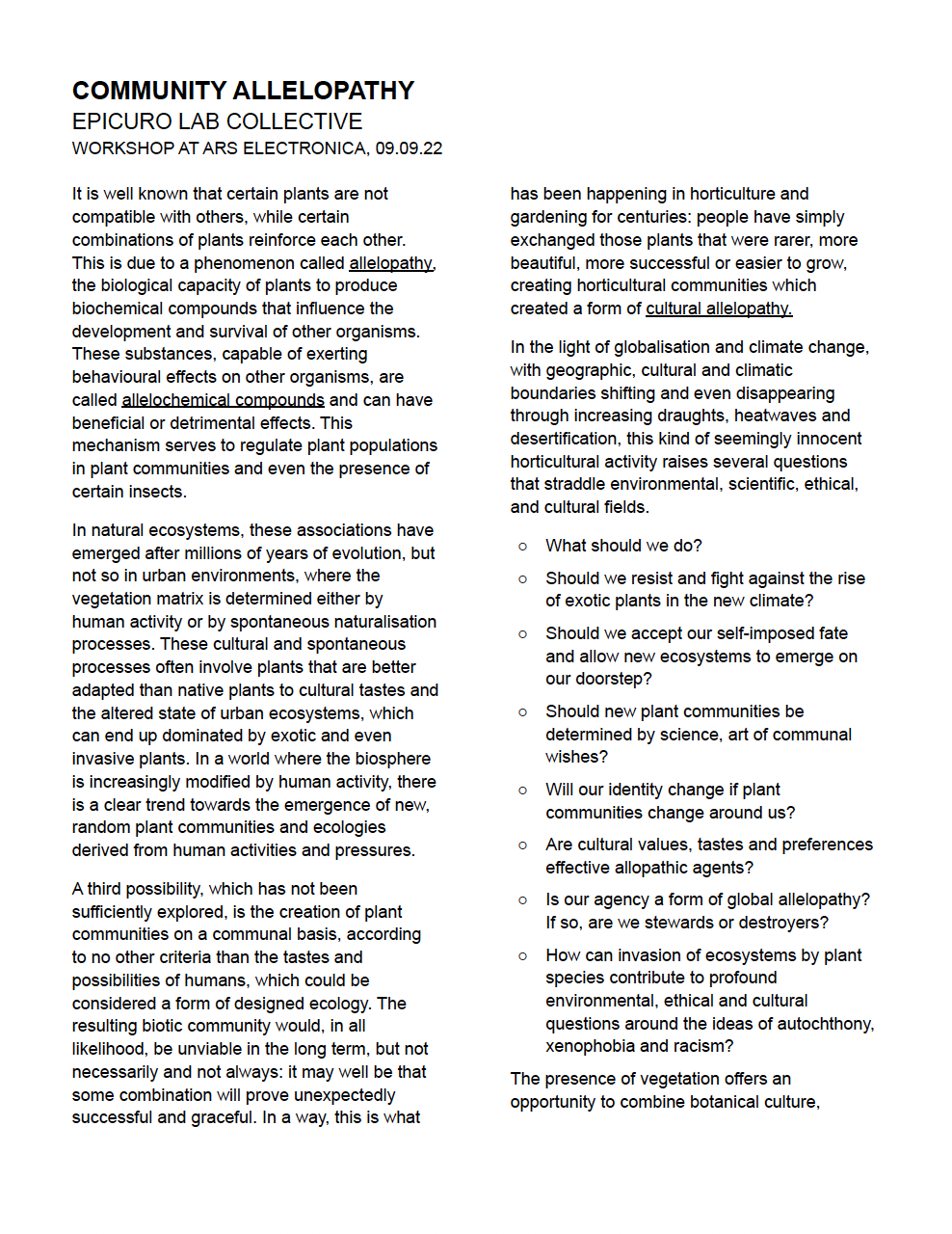
EXHIBITION: Ars Electronica Festival 2022
agosto 17, 2022
PRIX DAY: A Plantless Planet
noviembre 10, 2022CLOSING EVENT

COMMUNITY ALELLOPATHY
9th September 2022
Kepler's Gardens · JKU Campus, Linz, Austria
ABOUT
With a multidisciplinary approach, Epicuro Lab works in the field of urban ecology, where nature is controlled by humans, often too controlled. The collective creates ephemeral works and expands knowledge related to biodiversity in the urban environment. Departing from the phenomenon of plant allelopathy, Epicuro Lab starts their collaborative work together with Claudia Schnugg in the workshop Community Alellopathy, in the framework of Roots & and Seeds XXI’s participation in Ars Electronica Festival 2022: Welcome to Planet B.
WORKSHOP
It is well known that certain plants are not compatible with others, while certain combinations of plants reinforce each other. This is due to a phenomenon called allelopathy, the biological capacity of plants to produce biochemical compounds that influence the development and survival of other organisms. These substances, capable of exerting behavioral effects on other organisms, are called allelochemical compounds and can have beneficial or detrimental effects. This mechanism serves to regulate plant populations in plant communities and even the presence of certain insects.
During our workshop, Epicuro Lab discussed the potential of future forms of allelopathy with participants, who were encouraged to exchange knowledge about local plants and seeds, as well as bringing their own photos, drawings, or books about the plants they liked, know or own. With all this material, the workshop produced projections (more or less viable or fantastic) about the influence of human culture in the creation of future plant communities.
Download workshop working sheet here.
EPICURO LAB
Epicuro Lab is a collaborative art collective, whose core is composed of an atypical landscape architect and artist, Gabino Carballo, and an art producer and curator Tatiana Kourochkina. It was created in 2022 after the two collaborated within Roots & Seeds XXI.
With a multidisciplinary approach, Epicuro Lab works in the field of urban ecology, where nature is controlled by humans, often too controlled. Epicuro Lab creates ephemeral works and expands knowledge related to biodiversity in the urban environment. During its participation in Ars Electronica, the collective collaborates with Claudia Schnugg.
CLAUDIA SCHNUGG holds a PhD in social and economic sciences with an additional focus on cultural sciences and media arts. Her ongoing practice in the field of art and science is twofold: as scholar she is researching artscience collaborations, investigating effects and impact of such art-science exchange on actors, organizations involved and the relevance of the outcome. Thereby, she is also exploring new ways of employing artistic strategic strategies in scientific research. For example, she is currently principal investigator of the DIGI-Sense project at Johannes Kepler University Linz and realizes research on artscience processes for the Roots & Seeds XXI project. As a curator, she works with artscience processes, projects, and programs, but also develops exhibitions at the intersection of art and science. Currently, she is curating and consulting artist-in-residence programs and artscience projects at European Space Agency/ESTEC, Institute of Stem Cells and Epigenetics at Helmholtz Center Munich, Science Gallery Berlin, and the Swiss Arts Council Pro Helvetia. Her most recent book is Creating Art Science Collaborations (2019), published by Palgrave Macmillan.
TATIANA KOUROUKCHINA Master of Landscape Architecture from the University of Architecture of Venice, focused on Landscape Research applied to urban biodiversity and ecology, curator and producer of art related to science. Founder of the art and science foundation Quo Artis (Barcelona, ES) and a columnist for Retina Tendencias (El País, ES).
GABINO CARBALLO is a landscape architect and project manager with extensive experience in the application of nature based solutions, urban biodiversity promotion and green space design and management. He has worked for over sixteen years as a internal consultant for Barcelona’s Local Government, where he has worked on the implementation of naturalization policies and techniques. Prior to this he worked on public, corporate and private landscape and garden design, both in Spain and other countries. He is a regular guest lecturer in in various academic institutions and the author of several technical publications, articles and essays. He is also a board member of the Spanish association of public parks and gardens, with responsibility for communication and international relations. He has a long standing interest in art, design and their relationship with urban design and the environment.









